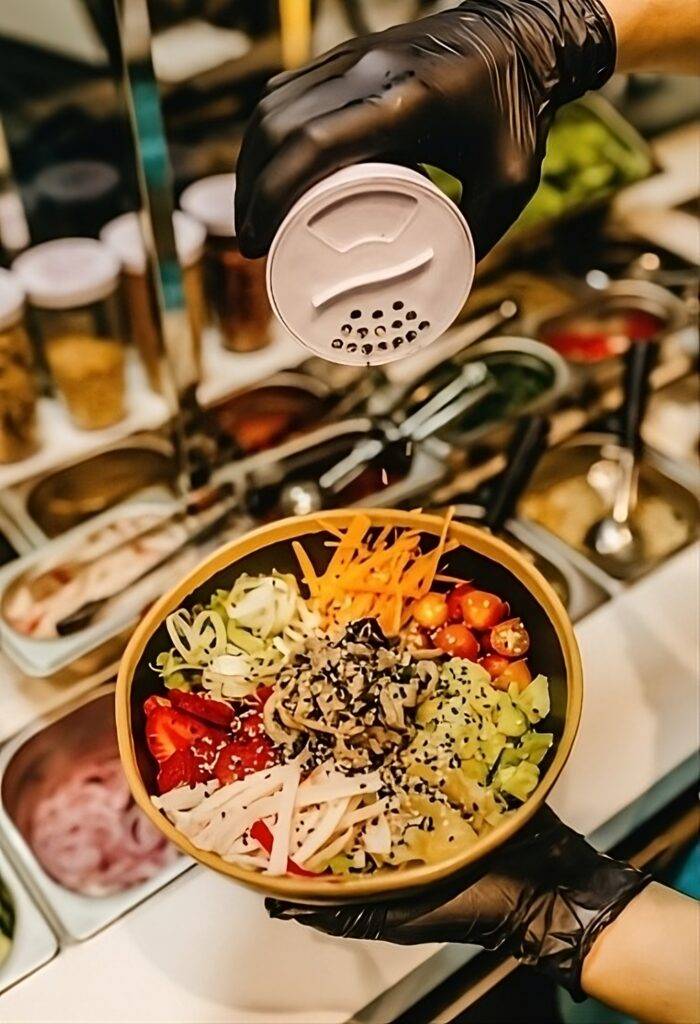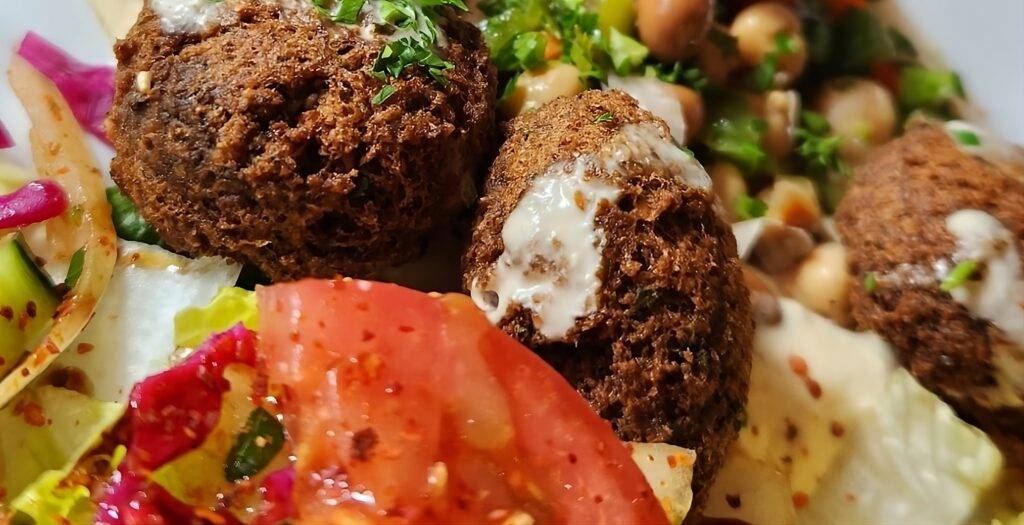Becoming vegetarian does not mean that you have to eat boring and bland food. There are tons of vegetarian recipes that are delicious, nutritious, and easy to make.
While meat has been a staple in many cultures and cuisines for centuries, a growing number of people are choosing to adopt a vegetarian diet. In fact, approximately 1.5 billion people around the world prefer to avoid meat and meat-based products.
In the United States alone, there are over 26,000 restaurants that cater to vegetarians and vegans, with a projected growth rate of 3.3% for 2023. If you are considering going vegetarian, here are some reasons why it might be a good idea.
Table of Contents
I will cover what to expect when becoming vegetarian. Experiment with new recipes and ingredients to find your favorite dishes. Explore sources such as vegetarian cookbooks, online blogs, or vegetarian social media groups to find inspiration.
Before you switch to a vegetarian diet, it’s essential to educate yourself on essential nutrients that are abundant in meat and how you can replace them from vegetarian sources. Protein, iron, and vitamin B12 are some essential nutrients that are typically found in meat but can be obtained from vegetarian sources.
For instance, plant-based foods such as tofu, tempeh, legumes, nuts, and seeds are rich in protein and iron, while vitamin B12 can be obtained from fortified cereals, dairy-free milk, and nutritional yeast.
When making big changes in your diet, it is best to start small and gradually increase your vegetarian meals. Start by having a meat-free Monday or one vegetarian day per week, then slowly increase to two or three days a week. This will help you get used to the new flavors and textures of vegetarian food while also giving your body time to adjust.
It is important to read food labels and menus carefully before making any purchase or ordering food at a restaurant. Some foods may contain animal products that you may not expect, such as gelatin, which is derived from animal bones and used as a thickener in many foods. Many restaurants offer vegetarian options but make sure to clarify with the server if the dish is truly vegan or vegetarian.
Transitioning to a vegetarian diet can be challenging, and it’s okay if you slip up. Don’t beat yourself up if you accidentally eat something that isn’t vegetarian. Instead, focus on the progress you have made and get back on track with the next meal.
One of the most compelling reasons to become a vegetarian is the impact of animal agriculture on the environment. According to some estimates, livestock farming is responsible for up to 14.5% of global greenhouse gas emissions, more than all modes of transportation combined.
It also requires extensive land use, leading to deforestation and the displacement of wildlife. By reducing your meat consumption, you can help to slow climate change and protect wildlife habitats.
Eating Vegetarian Nutrition.gov
In addition to its environmental advantages, a vegetarian diet can also have significant health benefits. Studies show that vegetarians are at a lower risk of heart disease, type 2 diabetes, and some forms of cancer. A plant-based diet can also help you maintain a healthy weight and improve your digestion.
However, it’s important to note that a poorly planned vegetarian diet may lack essential nutrients such as protein, iron, and vitamin B12. Be sure to consult with a healthcare professional or registered dietitian to ensure you are meeting all your nutritional needs.
Many people find it easier to make a gradual transition to a vegetarian diet instead of quitting meat cold turkey. Start by eliminating red meat from your diet, then poultry and fish.
You can replace these sources of protein with plant-based alternatives like tofu, tempeh, lentils, quinoa, and chickpeas. You can also include a range of fruits and vegetables and whole grains like wheat, quinoa, and barley to ensure that you get enough carbohydrates and minerals.
Michele Redmond
Registered Dietitian Nutritionist
Arizona State University
Vegetarian Diet
Like any dietary choice, there are pros and cons to being a vegetarian. On the plus side, vegetarians often have a lower risk of developing chronic diseases like heart disease, diabetes, and some forms of cancer. They typically have lower cholesterol levels and consume more antioxidants and fiber.
Additionally, vegetarians usually contribute less to environmental degradation linked to animal agriculture.
However, there are also some cons to a vegetarian diet. Some vegetarians may find it challenging to get enough protein and essential nutrients, like vitamin B12. Depending on their food choices, they may also miss out on some important nutrients, particularly iron.
However, vegetarians can still get enough protein and nutrients with diligent planning and the proper variety of plant-based foods.
One of the golden rules for a healthy vegetarian diet is eating a variety of foods, especially plant-based. You should also aim for whole foods instead of processed ones from time to time. Be mindful of your portions and avoid overeating calorie-rich foods or too many carbs.
The Healthiest Vegan Ingredients to Incorporate into Your Diet
Moreover, drink plenty of water, exercise regularly, and get enough sleep to maintain overall health.
- Globally, approximately 1.5 billion people prefer to avoid meat and meat-based products.
- As of 2023, there are close to 27,000 restaurants in the United States that are Vegetarian or Vegan based.
- In the U.S., 4% Identify as Vegetarian, 1% as Vegan
Varieties of Vegetarians

Vegans (Total Vegetarians)
Vegans avoid all animal products and by-products, including meat, poultry, fish, dairy, eggs, honey, and gelatin. They rely on fruits, vegetables, grains, legumes, and soy products for their nutritional needs. As a result, they may require supplements to get enough protein, vitamin B12, and iron. Vegans embrace this lifestyle for ethical, environmental, and health reasons.
Lacto-Ovo Vegetarians
Lacto-Ovo vegetarians do not eat meat, poultry, or fish, but they include eggs and dairy products in their diet. This is the most popular type of vegetarianism, and it is relatively easy to follow. Lacto-Ovo vegetarians get protein from eggs and dairy, and they can add supplements for extra vitamins and minerals.
Lacto Vegetarians
Lacto vegetarians avoid meat, poultry, fish, and eggs, but they consume dairy products. This type of vegetarianism is prevalent in India, where dairy products play a significant role in cuisine.
Lacto vegetarians do not have trouble getting enough protein and calcium from milk and cheese, but they need supplements for vitamin B12 and iron.
Ovo Vegetarians
Ovo vegetarians do not eat meat, poultry, fish, or dairy products, but they include eggs in their diet. They rely on eggs for protein, iron, and vitamin B12, and they can add supplements for other nutrients.
Ovo vegetarianism is relatively uncommon, but some people follow it for ethical or health reasons.
Partial Vegetarians
Partial vegetarians are those who avoid meat, but some may eat fish (pesco-vegetarian or pescatarian) or poultry (pollo-vegetarian). These diets are not technically vegetarian since they include animal flesh.
However, they offer a compromise between vegetarianism and a meat-based diet. Pesco-vegetarians can get protein and omega-3 fatty acids from fish, while pollo-vegetarians can opt for lean chicken or turkey for protein.
The Hybrid Vegetarian Diet

Essentially, a Flexitarian Diet is a mostly vegetarian diet with some flexibility to include occasional meat or animal products. While technically it may not fit the strict definition of vegetarianism, the Flexitarian Diet can certainly help those who are looking to reduce their meat intake without fully committing to a vegetarian lifestyle.
By incorporating more plant-based food into your diet, you may find that you feel better and even lose weight. The key is to find a balance that works for you and your health goals.
The hybrid vegetarian diet has become popular over the years because of its flexibility and the benefits of eating more plant-based foods. This style of eating encourages the intake of mostly plant-based foods, such as fruits, vegetables, whole grains, and legumes.
While meat and other animal products are not banned, their consumption is limited. The primary goal of this diet is to improve health, prevent chronic diseases, and contribute to a more compassionate and sustainable world by reducing the consumption of animal products.
One of the biggest advantages of the hybrid vegetarian diet is that it reduces the risk of chronic diseases such as heart disease, type 2 diabetes, and some cancers. Plant-based foods are rich in vitamins, minerals, and fiber, which help to promote good health.
Incorporating more plant-based foods in your diet also helps to improve digestion, boost energy levels, and support weight management. Additionally, a hybrid vegetarian diet has a lower carbon footprint, making it an environmentally sustainable option.
When following a hybrid vegetarian diet, it’s essential to prioritize plant-based foods such as vegetables, fruits, whole grains, and legumes. These foods should make up most of your diet, with meat consumption being limited to one or two meals per week. It’s also essential to choose quality sources of meat and dairy, opting for grass-fed, organic, and hormone-free options.
One of the most significant challenges of a hybrid vegetarian diet is eating out or being a guest at someone’s home. It can be challenging to find restaurants with suitable options or have a guest dish without offending the host. However, with the right planning, it’s possible to overcome these issues. Research restaurants in advance, or if you’re going to someone’s home, offer to bring a dish that fits your dietary needs.
If you are considering switching to a hybrid vegetarian diet, it’s essential to do it gradually. Start by incorporating plant-based meals into your diet, such as vegetarian breakfast options or plant-based snacks. Gradually decrease your meat intake until you reach the level that’s healthy for you. Doing it incrementally makes for a more sustainable change that is easier for your body to adapt to.
First and foremost, both vegetarian and vegan diets have been shown to improve our overall health. A balanced plant-based diet can lower cholesterol, reduce our risk of heart disease, and certain cancers, and improve gut health.
Benefits and Challenges of Vegetarian and Vegan Eating
Vegans and vegetarians generally consume more fiber, vitamins C and E, folate, and phytochemicals than meat eaters. Not to mention, an animal-free diet reduces our exposure to antibiotics, hormones, and other harmful chemicals that are often used in meat production.
Best Fruits and Vegetables for Juicing
Another major benefit of vegetarian and vegan eating is that it can reduce our carbon footprint and lessen our impact on the environment. Meat production is one of the biggest contributors to climate change, and it has a larger water and land-use footprint than plant crops.

However, transitioning to a vegetarian or vegan diet may present some challenges, particularly for those who are accustomed to consuming meat as part of their regular diet.
One common concern is that plant-based diets may not provide enough protein, iron, and vitamin B12. While it is true that these nutrients are abundant in meat, there are plenty of plant-based sources that can provide them such as lentils, beans, tofu, quinoa, fortified cereals, and milk alternatives.
If you are interested in trying out a vegetarian or vegan diet, there are plenty of resources available to help make the transition easier. Websites and cookbooks offer endless recipe ideas, and there are even meal delivery services that cater to plant-based diets.
One thing to keep in mind is that not all plant-based foods are created equal, and it’s important to eat a variety of different fruits, vegetables, grains, and proteins to get all of the necessary nutrients.
Meat substitutes have become incredibly popular in recent years, and all for good reason. Unlike meat, they contain no cholesterol and are low in saturated fat.
Healthy Eating Habits for Natural Weight Loss
In addition, they are high in fiber, vitamins, and minerals that are essential for the body. For instance, they are a good source of iron, calcium, and omega-3 fatty acids, which are important nutrients that are usually found in animal products.
Meat substitutes may appear to be nutritionally similar to meat, but they often contain highly processed ingredients, and high amounts of sodium, and fat. Since these substitutes lack vital nutrients found in meat, such as iron and vitamin B12, people who rely heavily on meat substitutes may suffer from nutrient deficiencies.
Are Meat Substitutes Healthy?
One of the most popular meat substitutes is tofu, which is made from soybean curd. Tofu is rich in calcium, iron, and protein, and is low in calories and saturated fat.
It is also very versatile and can be used in many dishes, from stir-fries to smoothies. Another popular meat substitute is tempeh, which is made from fermented soybeans. Tempeh is high in protein and fiber and is also a good source of vitamins and minerals.
Seitan is another popular meat substitute, which is made from wheat gluten. It is very high in protein and can be used in many dishes that call for meat. However, since seitan is made from wheat gluten, it is not recommended for those who have celiac disease or gluten intolerance.
Another popular meat substitute is legumes, which are beans, peas, and lentils. Legumes are high in fiber, protein, and other nutrients that are essential for the body. They are also low in fat and calories, making them a great addition to any diet.
Artificial meat vegan food is considerably more expensive compared to the price of real meat. In doing so, it excludes people who cannot afford such luxuries. So, it is essentially applicable to a category of people who can afford it, the very opposite of what veganism and vegetarianism should mean.
Meat substitutes advertise themselves as environmentally friendly, but this claim is far from the truth. The production of these alternatives requires extensive processing, transportation, and packaging – as a result, the manufacturing process involves a higher carbon footprint than naturally grown produce.

While some meat-free alternatives are more palatable than others, there is something uncanny and synthetic about fake meat vegan food. The textures and flavors are often not perfect, and people who are accustomed to meat may find them underwhelming. This may also be a turn-off for people looking to make the switch from meat to veganism.
Despite being touted as animal-friendly, fake meat vegan food manufacturers still don’t seem to live up to their ethical claims. For instance, certain brands of meat substitutes use animal products or by-products in the processing or fertilization process.
Apart from this, a large portion of these meat substitutes still undergo animal testing before hitting the shelves.
The Plant-Based Meat Industry
Over the past few years, the plant-based meat market has seen immense growth and popularity with a projected worth of $33.3 billion by 2031.
This rise in demand can be attributed to a number of factors, including an increase in veganism, concerns over animal welfare, and health benefits.
As the demand for plant-based meat increases, so does its accessibility. Many grocery stores now offer a wide variety of plant-based meat options, making it easier for consumers to make the switch from traditional meat. Additionally, more and more restaurants are incorporating plant-based options into their menus, making it a more feasible option when eating out.
Additionally, plant-based meat products tend to have a higher fiber content and are often fortified with vitamins and minerals not found in traditional meats. For example, Impossible Foods’ burger contains as much iron as a traditional beef burger, without the cholesterol or saturated fat.
Plant-based meat is not limited to just burgers anymore. As the market continues to grow, so does the variety of products available. Consumers can choose from plant-based chicken, sausage, shrimp, and even tuna. Companies such as Beyond Meat and Impossible Foods have been leading the trend with their innovative products that closely mimic the taste and texture of traditional meat.
Countries With the Highest Rates of Vegetarianism
#1 India
It is no surprise that India tops the list of countries with the highest rates of vegetarianism. In fact, approximately 38% of the population in India considers themselves vegetarian. Vegetarianism has been a part of India’s cultural and religious traditions for thousands of years.
Many Hindus and Jains follow vegetarianism as a way of practicing non-violence and compassion towards all living beings. Additionally, the cuisine in India is predominantly vegetarian, making it easier for people to transition to a meat-free lifestyle.
Israel is another country with a high percentage of vegetarians, with roughly 13% of the population following a vegetarian diet. Israel has a long history of vegetarianism, dating back to the time of the ancient Hebrews.
In modern times, vegetarianism is gaining popularity in Israel due to the health benefits associated with the plant-based diet. Additionally, Israel has numerous vegetarian restaurants, making it easy for individuals to find vegetarian options when dining out.
Italy may not typically be associated with vegetarianism, but it is actually the country with the highest percentage of vegetarians in the European Union, with around 10% of the population following a vegetarian diet.
This is largely due to the influence of the Seventh-day Adventist Church, which promotes a vegetarian lifestyle for its followers. Additionally, the Mediterranean diet, which is rich in plant-based foods, has become increasingly popular in Italy.
U.S. Adults Identifying as Vegetarian
Taiwan has seen a significant increase in the number of vegetarians in recent years, with approximately 13% of the population following a vegetarian diet.
This is largely due to the influence of Buddhism, which has a strong presence in Taiwan. Many Buddhists follow a vegetarian diet as a way to practice compassion and avoid harming living beings.
Additionally, the government in Taiwan has implemented several initiatives to promote vegetarianism, such as meat-free school lunch programs.
Austria and Germany are tied for fifth place with 9% of the population being vegetarians. Many people in these countries follow vegetarianism for ethical reasons, and it is common to find vegetarian options in restaurants.
The environmental impact of animal agriculture is also a concern in these countries, which has led many people to choose vegetarianism.
The United Kingdom is also tied for fifth place with 9% of the population being vegetarians. The rise in vegetarianism in the UK is due to health and ethical reasons.
Brazil is at the bottom of our list with 8% of the population being vegetarians. The rise in vegetarianism in Brazil is due to health reasons and the growing concern for animal welfare.
Many people in Brazil are also trying to reduce their carbon footprint, and vegetarianism is one way to achieve that.

Cross-Contamination When Becoming Vegetarian
Cross-contamination happens when one food comes in contact with another, potentially contaminating it with allergens or animal products.
This is a critical issue for individuals who follow a strict vegan or vegetarian diet. For example, a spatula used to flip a meat patty is then used on a veggie burger, contaminating it with animal products.
Why Is the Mediterranean Diet So Powerful?
The good news is that there are steps you can take to help minimize cross-contamination in your kitchen, including washing utensils and cooking surfaces thoroughly, using separate cutting boards for meat and vegetables, and not using the same cooking oil for both meat and plant-based foods.
By taking these precautions, you can help ensure that your vegan or vegetarian meal stays safe and free from unwanted elements.
Cross-contamination is not just a problem in restaurants but also in our homes. For instance, someone using a knife to cut meat and then using the same knife to cut vegetables can result in cross-contamination. It can lead to foodborne illnesses or bacteria, especially in food items that need to be cooked like tofu and tempeh.
It is equally important for vegans and vegetarians to pay attention to the ingredients and labels on food items they consume. Cross-contaminated ingredients can be harmful to vegans and can result in the consumption of animal-based products.
Preventing Cross-Contamination
Every ingredient should be thoroughly checked before buying, and while eating out, vegans should always ask about the ingredients used in a dish. This information helps them avoid consuming animal-based ingredients, accidentally or otherwise.
Another way to avoid cross-contamination is to have a separate cooking area and tools, including pots, pans, and utensils. These instruments should be only used for plant-based cooking. If not possible, they should be thoroughly washed and dried before use.
Having a separate cooking area helps prevent contamination and assures vegans that they are following a plant-based diet.
It is also important to note to be aware of non-food items that contain animal-based ingredients or are tested on animals. These products include makeup, skincare, and clothing. Even if the product does not contain animal-based ingredients, it’s better to check whether the product is vegan-friendly. Checking ingredients and making sure that products are plant-based is crucial in the fight against animal cruelty.
Sangeeta Shrivastava, MS, PhD, RDN, FAND
Registered Dietitian Licensed Nutritionist
Utah State University
https://www.linkedin.com/in/sangeeta-shrivastava-phd-rdn-fand-3a5aa611/
Dr Sangeeta Nutrition | Facebook
Dr Sangeeta Shrivastava PhD, RDN, FAND (@dr_sangeeta_nutrition) • Instagram photos and videos
Becoming vegetarian has its challenges. Plant-based meat is only part of the vegetarian diet. We cover the varieties of vegetarian and vegan eating.
Contact us today
Email: [email protected]
Phone: (346) 593-5619
Contact Human Resources Email:
Contact Operations Email:
Contact Authors for Her Weight Loss Email:
Customer Service Email:
With our team of experts who have years of industry experience, we provide valuable diet and nutrition tips that have helped countless members reach their goals. Welcome to Her Weight Loss where we are dedicated to helping individuals achieve their ideal weight and live a healthy lifestyle.
As an award-winning company, we take pride in earning the trust of our readers by offering knowledge-based methods for sustainable weight loss. We understand that everybody is unique which is why we believe in empowering individuals to make informed decisions about their health and well-being.
Our mission is to guide and support our community toward a healthier lifestyle through proper nutrition and exercise. Our vision is to create a world where everyone feels confident in their skin and lives life to the fullest.
Join us on this journey and let us help you become the best version of yourself. Together we can achieve lasting results that will not only improve your physical well-being but also enhance your overall quality of life. Trust Her Weight Loss for expert guidance on your weight loss journey.